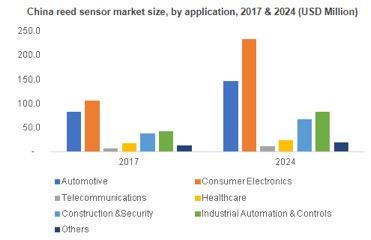Attributing to a widespread application spectrum, the global reed sensor market was valued at over $1 billion according to a 2017 estimate. Reed sensors are basically devices made up of reed switches that incorporate a pair of flexible magnetic reeds and can be used in various applications ranging from flow and liquid level measurement to motion detection and sensing, proximity sensing and metal detection. One of the major factors behind the sensor’s rapidly growing demand is its robust and reliable nature and the low power consumption that allows for the device to be used in a plethora of battery-operated applications.
It is anticipated that the expansion of the smart home market in developed nations across the world would be further fuelling the growth of the reed sensor market. Moreover, GMI says the incredible rate of production that the consumer electronics market is witnessing across developing nations would also be responsible for propelling global reed sensor market further.
Asia Pacific reed sensors market dominates the industry and GMI expects it to grow in terms of unit shipment at a CAGR of 12.5%. This is attributed to the established electronic and automotive industries of Taiwan and China respectively. Shanghai and Beijing are the major regions for the manufacturing of automobiles, communication equipment, and electronics in China, augmenting the market. Government support provided to Taiwan’s electronics industry is one of the major factors augmenting demand. Growing market for smart home devices in South Korea is further contributing toward industry growth, adds GMI. A high demand for remote home monitoring systems is creating opportunities for the market as many manufacturers are expanding their smart home product portfolios.

The research study of Reed Sensor further segmented into product, application and contact position
Product is classified into Dry, Mercury Wetted. GMI anticipates the dry reed sensor market to witness a growth of over 9.5% from 2018 to 2024, due to the growing transition of manufacturers to adopt dry switching technology over mercury-wetted. This shift is driven by rising environmental concerns regarding the use of mercury. Though mercury-wetted provides more consistent contact resistance, the growing use of mercury in electronic components is being regulated by countries all over the world in consideration of the Minamata Convention.
Application is classified into automotive, consumer electronics, telecommunications, healthcare, construction and security, industrials controls and automation. The increasing incidence of heart diseases have propelled the demand for such medical devices ensuing the growth of the reed sensor market, says GMI. These sensors are used in defibrillators and pacemakers for heart conditions such as bradycardia and tachycardia in which the heart beats at an abnormal rate. The devices enable this equipment to operate with high precision and the device mode is changed with a magnet externally.
Compact sensors are being manufactured for such devices which are exclusively manufactured for use in life saving equipment are very compact and have a very high degree of reliability and precision. Other medical equipment in which it finds applications include capsule endoscopy, glucose monitors, neuromodulation, core body temperature capsule etc. contributing to the reed sensor market.
Contact position is classified into Form A, Form C. Form A is estimated to hold the largest market share owing to their capability to be manufactured in smaller sizes than other contact forms. This is driving their demand across various verticals contributing towards the growth of the market, according to GMI.
Asia Pacific is projected to dominate the reed sensor market due to their demand from the electronics industry from regions such as Taiwan, South Korea and China. The flourishing automobile market in China is one of the major factors for the demand for these components for passenger comfort and other electronic systems, concludes GMI.







